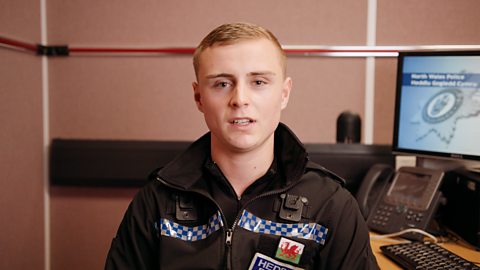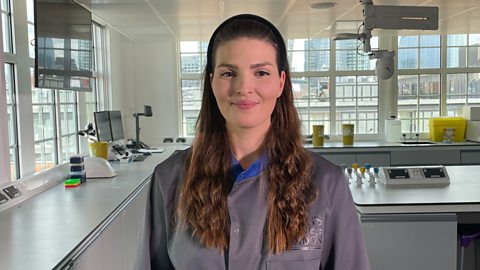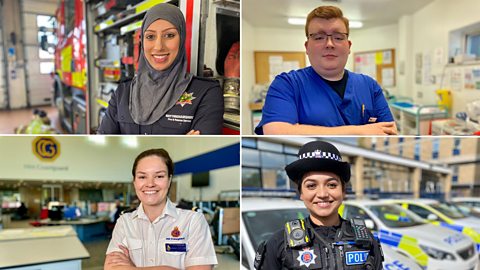Meet Sanna, 28, a trainee detective with South Wales Police. Find out more about her job and journey into the role.
Part of our Bitesize world of work series.
I investigate crimes and protect people. I love making people feel safe.
Sanna:
My name is Sanna, and I'm a trainee detective.
I investigate crimes and protect people. I love making people feel safe.
As a trainee detective, we have the same powers as a police officer. However, now we have the time to focus on serious and complex crimes where we can gather evidence, we can read through reports and just build a case file for court.
When I arrive in work, I start off by checking my emails, checking my incident logs to see if any incidents have come in overnight.During the team briefing, we will discuss the incident, discuss the evidence that we have. We will then make a plan in relation to who will deal with the victims, who will deal with the suspect.
I will start off by reviewing all of the documents that are needed, so for example, I will request documents from social services, could be the council, getting some statements from witnesses. When I conduct a search at somebody's house, I will document everything in this search. If anything was found, where it was found, take pictures of where it was found.
I take swab tests from people when I'm investigating to link them to the occurrence or to eliminate them from the occurrence. I will use CCTV footage when I'm investigating a matter, I want to see what's happened.
I will then go onto interviewing the suspect. This gives them an opportunity to give their account, or version of events of what's happened.
One of the pressures of the job, I find, are that it is constantly busy, which can also be seen as a positive because you are constantly dealing with matters and attending locations to gather evidence.
After my law degree, I applied to become a police officer. I completed two years of training, which I really enjoyed, I absolutely loved being out and about, however I wanted to investigate matters from start to finish which I now am able to do. So I will start off by attending a scene and then taking it all the way through to court.
The most important skills, I find, the first one I'd say is organisation skills. Secondly, you need to have patience and you need to have that care towards people. The circumstances are constantly changing, so you need to make decisions accordingly.
Cara, supervisor
What makes Sanna a really good Detective is the fact she's passionate about the job that she does. She wants to make a difference, she wants to help people when they're really at that hour of need.
Sanna:
What I love most about my job is getting positive results for victims, and also just solving crimes, putting everything together in a file, having a look at the bigger picture.
I absolutely love giving victims and everybody that I work with the time that they deserve.
- Sanna is a trainee detective. She is a member of the police force and her job is to investigate serious crimes.
- Sanna studied a degree in Law and then trained to become a police constable.
- After three years in that role, she heard about the opportunity to apply for a detective training programme, where she learns on the job and develops skills needed to become a detective.
- Her days are varied and involve working alongside her supervisor and other members of the police force, including crime scene investigators and forensics departments.
- Her role involves interviewing suspects and researching and examining evidence.
- The main skills and attributes Sanna uses in her role include organisation, patience and decision making.
- Sanna works in a team, but also puts forward her own ideas and follows up leads independently.
- Once Sanna completes the necessary training, she will continue to work towards becoming a fully qualified detective constable, able to specialise in a particular area.

Top tips
- Work hard at school. But remember that life skills are important too.
- Learn about the communities around you, and how you can help improve them for everyone.
- Build your confidence. Find experiences to help you build leadership and people skills.

Once Sanna completes the necessary detective training, she will continue to work towards becoming a fully qualified detective constable. Detectives are accredited police officers. Police officers keep law and order, investigate crime, and support crime prevention.
What to expect if you want to be a police officer
- Police officer average salary: £19,164 to £41,130 per year.
- Police officer typical working hours: 37 to 40 hours per week. You could work different shifts on evenings, weekends and bank holidays.
What qualifications do you need to be a police officer?
You could get into this role via a university course, a college course, an apprenticeship, working towards the role or applying directly.
Sources: LMI for All, National Careers Service.
This information is a guide and is constantly changing. Please check the for the latest information and all the qualifications needed.
For careers advice in all parts of the UK visit: , , and .

Dylan: police constable. video
Dylan started on his path to being a police constable as a volunteer.

Lucinda: forensic scientist. video
Lucinda is a forensic scientist, testing and analysing evidence to help solve crimes.

Jobs that give back: My frontline career. video
Hear from four young people – a firefighter, nurse, police sergeant and coastguard – who are helping others via their frontline careers.
